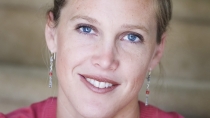My Illness is Not My Identity
I was asked by Diana Keough of ShareWIK.com to write about the topic of living with bipolar without letting my mood disorder define me. You can get to her blog post by clicking here.
“A label is a mask life wears,” writes Rachel Naomi Remen, M.D., one of the first pioneers in the mind, body, health field. “Labeling sets up an expectation of life that is often so compelling we can no longer see things as they really are. . . . In my experience, a diagnosis is an opinion and not a prediction. What would it be like if more people allowed for the presence of the unknown, and accepted the words of their medical experts in the same way? The diagnosis is cancer. What that will mean remains to be seen.”
I used to think that meant that I shouldn’t call myself bipolar, that I should stay away from hospital psychiatric programs, therapists, and head doctors; that I shouldn’t take antidepressants, mood stabilizers, or any kind of sedative; and that I should rely on nothing but my inner strength to carry me forward through the hard days.
Having tried that, and failed (really, really failed), I have come to a new understanding of that quote. For those of us with chronic illnesses that we can’t imagine away, I believe Dr. Remen simply encourages us to make decisions as individuals, not necessarily as bipolars, or diabetics, or cancer victims. We will always have to be mindful of our diagnoses, of course, in our relationships and work ventures. Because we need to surround ourselves with supportive people who will undergird our recovery, and we must maneuver our careers in ways that will aid our health.
But first and foremost we are individuals, not bipolars or sick people.
This is probably one of the hardest task for me as a person who struggles with a few kinds of mood disorders … to know when I can temporarily forget that I have a power failure in my prefrontal cortex (part of the frontal lobes of the brain), and that my amygdala (fear center) has a propensity to bounce up and down like Tigger in Whinnie the Pooh … when to do something really risky–like have a baby or sign a contract promising to deliver two to four blogs a day for a year–and when to rein in all opportunities and play it safe.
I never really know until after the decision is made.
I suppose it’s an exercise in saying the Serenity Prayer: trying to identify the things I can’t change, the things I can, and asking God for a little assistance in telling them apart. In her book, “The Wisdom to Know the Difference,” Eileen Flanagan writes about how we can better live the Serenity Prayer … or navigate more gracefully through the thorny territory between our diagnoses and our opportunities. Much of it, she says, comes from accepting ourselves: with our cotton mouths and extra pounds, with our hypersensitivity to noise and stimulation, with our low threshold for stress. She writes:
Accepting life’s flat tires seems to be easier for people who have accepted themselves. If you know who you are, what you are capable of, and what you are called to do, you are much less likely to waste your time and energy sweating the small stuff or even the big stuff you cannot change. You are less likely to project your uncomfortable feelings onto other people, instead of facing your feelings and learning what they have to teach you. You are less likely to waste time trying to change other people and more likely to influence them with a positive example.
I’d like to think she’s right … that the more we accept ourselves with our limitations, the more freedom we feel in living as individuals, not merely as bipolars, diabetics, or cancer victims, and the better we can distinguish the things that we can’t change from the things that we can.
Here’s to trying anyway.
Therese J. Borchard writes the daily blog, “Beyond Blue,” on Beliefnet.com and is author of “Beyond Blue: Surviving Depression & Anxiety and Making the Most of Bad Genes” and “The Pocket Therapist: An Emotional Survival Kit.” Subscribe to Beyond Blue here or visit her at www.ThereseBorchard.com.

Therese Borchard Bio
Therese Borchard is the author of the hit daily blog “Beyond Blue” on Beliefnet.com.
Learn More